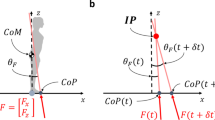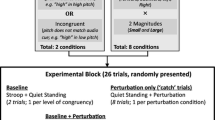Abstract
The central nervous system (CNS) must routinely compensate for unpredictable perturbations that occur during postural tasks. Such compensations could take the form of feedforward or feedback control. This study investigated whether the CNS, when faced with a potential postural perturbation, employs feedforward adjustments to reduce the near-term and overall likelihood of balance loss. Slips were induced, using bilateral low-friction platforms, during a sit-to-stand task in 60 safety-harnessed young adults. Subjects underwent a block of slipping trials, a block of nonslipping trials, then a mixed block of trials. After the first novel and unexpected slip, subjects were aware that a slip “may or may not occur.” The state (horizontal position and velocity) of the body center of mass (COM) at seat-off and the direction of balance loss (forward, no loss, backward) were determined for each trial. Feedforward adjustments were identified as between-trial changes in COM state at seat-off. Effects of these adjustments on the likelihood of balance loss were quantified using logistic regression. Results indicated that the likelihood of balance loss in each direction (forward, backward) under each condition (slipping, nonslipping) was significantly related to the COM state at seat-off. When faced with the potential perturbation, the CNS made near-term feedforward adjustments to reduce the likelihood of balance loss under the conditions last experienced; exposure to slipping and nonslipping conditions resulted in adjustments that reduced the likelihood of backward and forward balance losses, respectively. Subjects adapted their performance over the longer-term in a manner that significantly decreased their overall likelihood of balance loss in either direction under either condition. The CNS thus adapted to acquire an “optimal” movement strategy that reduced the reliance on reactive responses to maintain balance in an uncertain environment.
Similar content being viewed by others
Author information
Authors and Affiliations
Corresponding author
Rights and permissions
About this article
Cite this article
Pavol, M.J., Pai, YC. Feedforward adaptations are used to compensate for a potential loss of balance. Exp Brain Res 145, 528–538 (2002). https://doi.org/10.1007/s00221-002-1143-4
Received:
Accepted:
Published:
Issue Date:
DOI: https://doi.org/10.1007/s00221-002-1143-4




